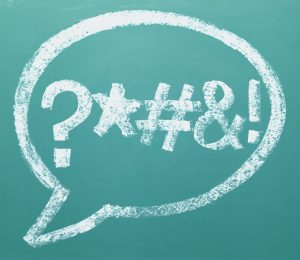Changes to expressive language abilities will affect the person’s ability to speak, sign or write language. These changes do not arise because of physical impairment (e.g. dysarthria, dyspraxia though may co-occur with them. People with dysphasia often know what they want to say, sign or write – they are just unable to find the right words and string them together in order to accurately and easily communicate their intended message. Changes to expressive language may make speech appear very effortful and hesitant. Conversely, some people with dysphasia speak fluently without effort yet their speech remains difficult to understand.
Expressive language characteristics of dysphasia may include:
- Word finding difficulties, i.e. difficulty producing correct words even though the person with dysphasia knows what they want to say. Sometimes the person really struggles to produce any useful speech. Characteristics of word finding difficulty may include:
- Use of wrong words e.g. the person may say yes instead of no, tea instead of coffee, run instead of walk, happy instead of sad.
 Sometimes they may say a word that has no obvious connection with the intended word e.g. say fire instead of medicine.
Sometimes they may say a word that has no obvious connection with the intended word e.g. say fire instead of medicine. - Use of the wrong sounds or letters in a word e.g. pet for pen, houndy for hungry.
- Becoming ‘stuck’ on a word or phrase: unintentionally repeating the same word/phrase when they actually mean to say something else. This is called perseveration.
- Inability to hone in on a particular word or phrase. This results in the person talking around the subject or describing attributes of a word in order to express meaning e.g. saying ‘err animal, it miaow’ to express the word ‘cat’, ‘they put me into an affiliation with two ladies to make sure I was moving’ (physiotherapy session). This is known as circumlocution.

- Use of words that are not actually part of the English language, they sound made up e.g. saying ‘hapiteshuns’’ for magic, ‘perdadusker’ for stethoscope. These are called neologisms.
- Swearing: please be aware that some patients may produce swear words more easily than other words and often unintentionally. This may not be their normal behaviour and can be distressing for them, their family and others.

- Over-use of non-specific vocabulary i.e. words that do not directly communicate meaning (e.g. it, thing, her, they) but depend on context for interpretation i.e. information the person will have already given. The person with dysphasia may use such vocabulary but be unable to provide the context required for interpretation.
- Use of wrong words e.g. the person may say yes instead of no, tea instead of coffee, run instead of walk, happy instead of sad.
- Use of short sentences. Speech does not sound fluent. Sometimes words like ‘a’ and ‘the’ are missed out or the endings of words are omitted (e.g. ‘I like going to the pub’ may be spoken as ‘like go pub’). Speech can sound ‘telegraphic’. Speech, sign and writing lacks normal grammatical structure.
- Speech that sounds superficially normal but the meaning is unclear. Some people with dysphasia use lots of words, speech can sound effortless and fluent but it can be hard to work out what the person means. Circumlocution (see above) may be prominent. ‘Jargon aphasia’ is the term used to describe communication that superficially sounds like it should make sense, but actually doesn’t. The person with Jargon aphasia may struggle to give enough ‘speaking turns’ to other people.
- Difficulty sticking to a topic, conversation becoming tangential, either gradually drifting off the topic or abruptly switching topics.
- Echolalia: the unintentional repetition of words or phrases the person hears/sees somebody else produce. This is not deliberate; it is not a behavioural problem. The person is unable to inhibit the repetition and cannot produce their intended words. Some people with dysphasia may also be echopraxic i.e. they may involuntarily imitate other people’s actions/gestures.
During interaction, the person who has dysphasia may recognise when they fail to communicate their intended message. They may try to self-correct. On other occasions they may be unaware. As a consequence of this, the person’s communication partner may pick up an unintended or incorrect message, yet believe this to be what the person with dysphasia intended. The potential for communication breakdown is significant.
Impairments of insight and awareness can further complicate communication if the person with dysphasia also has executive functioning difficulties. The person may be unaware of their language processing impairment and the potential for communication breakdown. Self-monitoring of communication is likely to be significantly impaired.